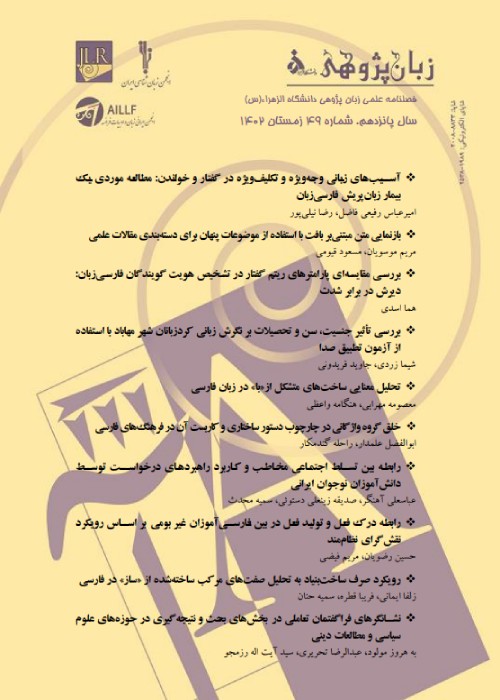Pragmatics and Apply it on advertisingCase study: Dorto dishwashing liquid
In rhetoric, the secondary meanings of the sentences are discussed. In the same way, in modern rhetoric, one can find theories that deal with this matter and are looking for ways to help them understand the secondary meanings of sentences. The sum of these theories is studied in a branch called pragmatics. Grice Cooperative Principles (1975) is one of these theories. After Grice, other theorists developed his Cooperative Principles. Leech (1983), Brown, and Levinson (1987) were among those who helped complete Grice's Cooperative Principles by introducing Politeness Principles. In conversation analysis based on Politeness principles, the role of each interlocutor in the continuity of the conversation and respect for the other party is measured. Different discourses can be analyzed on this basis. One of the most common discourses in today's society is the discourse that commercials create in society. TV commercials are one of the most effective methods of advertising as a public and popular media. At first glance, every commercial seeks to advertise its desired product, and in order to achieve its goal, which the introduction of the product and convincing the audience are the most important of them, is designed and distributed. But it should be noted that behind this face, it introduces a discourse into society that can have many positive and negative effects on the culture of that society.
In 1967, Grice proposed the theory of conversational Implicature and in 1975 in the paper entitled Logic and Conversation, he proposed a more advanced theory of the Cooperative Principles, or CP. Grice considers the four basic principles necessary for conversation, these four principles are quality, quantity, relation and manner of expression, which together form Grice's Cooperative Principles.Grice's Cooperative Principles, as a basic theory, have been reviewed by many. One of these people is Leech (1983) who believes that Grice's solutions are not enough to study conversations and therefore has proposed the Politeness Principles as a complement to Grice's Cooperative Principles. Brown and Levinson (1987) are other theorists who have theorized about the Politeness Principles and the completion of Grice's Cooperative Principles. Before addressing the principles of Leech (1983), Brown, and Levinson (1987) Politeness Principles, it is necessary to explain some interpretations and terms. One of the concepts that is considered in the Politeness Principles is the concept of face, followed by the face threatening act and the face-saving act. Attitude in technical terms, it means the general self-image of a person and refers to the emotional and social aspect of the person that each person has and expects others to recognize it. There are generally two types of images: negative and Positive; negative means the need to be independent of others and positive means the need to be associated with them. According to Brown and Levinson, politeness is about respecting another's face and using strategies to avoid threatening his face. They define four strategies for using face-threatening actions: on record, positive politeness, negative politeness, and off record.
The body of this research is formed by three commercials of "Dorto" dishwashing liquid that have been broadcast on various Iranian TV channels for about three years, and considering this relatively long period, its discursive role should not be neglected. In a number of conversations of these advertisements, Politeness Principles have been violated and the face of the other party has been threatened, and by this, they have hidden a discourse far from politeness in their deep-structure. In these advertisements, according to the principles of Leech, the Maxims of Approbation, Modesty and Agreement have not been observed, and according to the principles of Brown and Levinson, people have used strategies such as on record expression, which is the most threatening face. Although in some conversations they have tried to use negative and positive strategies, by violating the principles of Leech Principles, they have threatened the other party and caused tension in the conversations, thus creating an impolite discourse.All three of these ads focus on the party. Parties that are accompanied by tension and unhappiness when the guest arrives at the landlord's house and make the landlord's family members suffer. Aunt frowns, Violating the Politeness Principles, the man says to the woman: "Did you not wash with Dorto?"; The child apologizes for borrowing dishwashing liquid; All of this creates a discourse that turns value into anti-value. If the child did not lend the dishwashing liquid to the neighbor, it would not have caused all this discomfort, and even earlier, if the family members had not invited guests, they would not have had to endure this reprehensible atmosphere. This is the discourse that this ad depicts for the audiences.
Analysis of people's conversations in three Dorto dishwashing liquid commercials based on pragmatics showed that the discourses created in these ads are inconsistent with Iranian and Islamic culture and promote distasteful cultural values. The non-observance of the principles of cooperative and politeness in the conversations of individuals in these advertisements has created a discourse that leads to aversion to the discourse recommended in Iranian and Islamic culture, which is hospitality. Another value that has become anti-value in these conversations is the tradition of lending in the recommendations of Iranian and Islamic culture. Based on the research findings, in a number of conversations of these advertisements, Politeness Principles have been violated and the face of the other party has been threatened, and by this, they have hidden a discourse far from Politeness in their deep-structure. Cultural issues must be considered in advertisements because they inadvertently initiate a discourse into the culture of society, which can have many destructive consequences. According to the results of this study, it seems that TV commercials need more attention and review from a cultural perspective.
- حق عضویت دریافتی صرف حمایت از نشریات عضو و نگهداری، تکمیل و توسعه مگیران میشود.
- پرداخت حق اشتراک و دانلود مقالات اجازه بازنشر آن در سایر رسانههای چاپی و دیجیتال را به کاربر نمیدهد.



